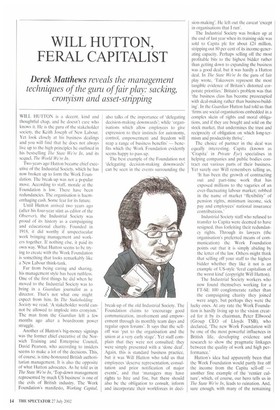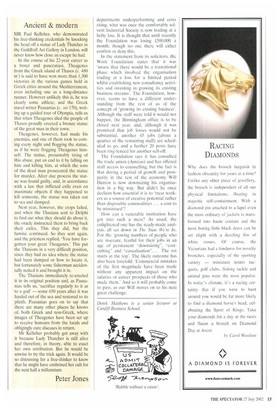WILL HUTTON, FERAL CAPITALIST
Derek Matthews reveals the management
techniques of the guru of fair play: sacking, cronyism and asset-stripping
WILL HU1TON is a decent, kind and thoughtful chap, and he doesn't care who knows it. He is the guru of the stakeholder society, the Keith Joseph of New Labour. Yet look closely at his business dealings and you will find that he does not always live up to the high principles he outlined in his bestselling The State Were In, and its sequel, The World Were In.
Two years ago Hutton became chief executive of the Industrial Society, which he has now broken up to form the Work Foundation. The break-up was not a popular move. According to staff, morale at the Foundation is low. There have been redundancies. The organisation is haemorrhaging cash. Some fear for its future.
Until Hutton arrived two years ago (after his four-year stint as editor of the Observer), the Industrial Society was proud of its history as a campaigning and educational charity. Founded in 1918, it did worthy if unspectacular work bringing management and workers together. If nothing else, it paid its own way. What Hutton seems to be trying to create with the Work Foundation is something that looks remarkably like a New Labour think-tank.
Far from being caring and sharing, his management style has been ruthless. One of the first things he did when he moved to the Industrial Society was to bring in a Guardian journalist as a director. That's not what one might expect from him. In The Stake/to/ding Society we read, 'A stakeholder world cannot be allowed to implode into cronyism.' The man from the Guardian left a few months ago after a boardroom power struggle.
Another of Hutton's big-money signings was the former chief executive of the Norwich Training and Enterprise Council, David Pearson, who according to insiders seems to make a lot of the decisions. This, of course, is time-honoured British authoritarian management. It is also the opposite of what Hutton advocates. As he told us in The State We're In, 'Top-down management represented by much US business' is one of the evils of British industry. The Work Foundation's manifesto, Working Capital, also talks of the importance of 'delegating decision-making downwards': while 'organisations which allow employees to give expression to their instincts for autonomy, control, empowerment and freedom will reap a range of business benefits' — benefits which the Work Foundation evidently seems happy to pass up.
The best example of the Foundation not 'delegating decision-making downwards' can be seen in the events surrounding the break-up of the old Industrial Society. The Foundation claims to 'encourage good communication, involvement and empowerment through its monthly team days and regular open forums'. It says that the selloff was `put to the organisation and the union at a very early stage'. Yet staff complain that they were not consulted; they were simply presented with a 'done deal'. Again, this is standard business practice, but it was Will Hutton who told us that employees 'deserve representation, consultation and prior notification of major events', and that 'managers may have rights to hire and fire, but there should also be the obligation to consult, inform and incorporate their workforces in deci sion-making'. He left out the caveat 'except in organisations that I run'.
The Industrial Society was broken up at the end of last year when its training side was sold to Capita plc for about £24 million, stripping out 80 per cent of its income-generating capacity. Perhaps selling off the most profitable bits to the highest bidder rather than getting down to expanding the business was a good deal, but it was hardly a Hutton deal. In The State We're In the guru of fair play wrote, 'Takeovers represent the most tangible evidence of Britain's distorted corporate priorities: Britain's problem was that 'the business class has become preoccupied with deal-making rather than business-building'. In the Guardian Hutton had told us that 'firms are social organisations embedded in a complex skein of rights and moral obligations, and if they are bought and sold on the stock market, that undermines the trust and reciprocity of obligation on which long-termism and productivity thrive'.
The choice of partner in the deal was equally interesting. Capita (known as 'Crapita' in Private Eye) specialises in helping companies and public bodies con tract out various parts of their business.
Yet surely our Will remembers telling us, 'It has been the growth of contracting out and part-time work that has exposed millions to the vagaries of an ever-fluctuating labour market; robbed in the name of market "flexibility" of pension rights, minimum income, sick pay and employees' national insurance contributions.'
Industrial Society staff who refused to transfer to Capita were deemed to have resigned, thus forfeiting their redundancy rights. Through its lawyers (the organisation's preferred means of communication) the Work Foundation points out that it is simply abiding by the letter of the law. Others might think that selling off your staff to the highest bidder whether they like it not is an example of US-style 'feral capitalism of the worst kind' (copyright Will Hutton).
The Industrial Society workers who now found themselves working for a FT-SE 100 conglomerate rather than the campaigning charity they joined were angry, but perhaps they were the lucky ones. At any rate the Work Founda tion is hardly living up to the vision creat ed for it by its chairman, Peter Ellwood (Group CEO of Lloyds TSB), who declared, The new Work Foundation will be one of the most powerful influences in British life, developing evidence and research to show the pragmatic linkages between the quality of work and high per formance.'
Hutton's idea had apparently been that the Work Foundation would partly live off the income from the Capita sell-off — another fine example of the `rentier culture', which, of course, our hero tells us in The State We're In, leads to ruination. And, sure enough, with many of the remaining departments underperforming and costs rising, what was once the comfortably solvent Industrial Society is now trading at a hefty loss. It is thought that until recently the Foundation was losing £500,000 a month, though no one there will either confirm or deny this.
In the statement from its solicitors, the Work Foundation states that it was 'aware that there would be a transitional phase which involved the organisation trading at a loss for a limited period whilst establishing new consultancy activities and investing in growing its existing business streams'. The Foundation, however, seems to have a different understanding from the rest of us of the concept of 'growing its existing business'. Although the staff were told it would not happen, the Birmingham office is to be closed next year, and, although it was promised that job losses would not be substantial, another 45 jobs (about a quarter of the remaining staff) are scheduled to go, and a further 20 posts have been ring-fenced for another sell-off.
The Foundation says it has consulted the trade union (Amicus) and has offered staff access to counselling, but the fact is that during a period of growth and prosperity in the rest of the economy Will Hutton is now downsizing his organisathm in a big way. But didn't he once declaim how essential it is to 'treat workers as a source of creative potential rather than disposable commodities . . . a cost to be minimised"?
How can a venerable institution have got into such a mess? As usual, the enlightened one has the ready-made analysis, all set down in The State We're In. For the 'growing numbers of people who are insecure, fearful for their jobs in an age of permanent "downsizing", "costcutting" and "casualisation"... The rot starts at the top'. The likely outcome has also been foretold: 'Commercial mistakes of the first magnitude have been made without any apparent impact on the salaries or career prospects of those who made them.' And so it will probably come to pass, as our Will moves on to his next great challenge.
Derek Matthews is a senior lecturer at Cardiff Business School.

































































 Previous page
Previous page